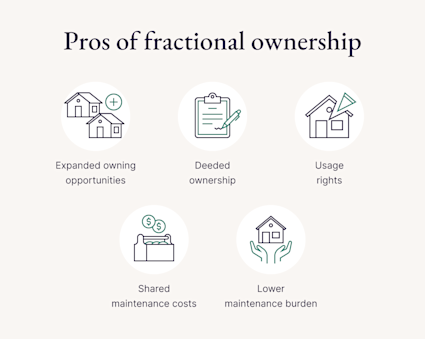| What is fractional ownership? |
|---|
| Fractional ownership is when multiple people share ownership of a high-value asset, such as a vacation home. Each person owns a portion of the property and gets usage rights, responsibilities and potential appreciation based on their share. |
Understanding fractional ownership
You’ll typically find fractional ownership for real estate like vacation homes. However, fractional ownership can also come into play for art, stocks and fashion. When owners purchase real estate assets with fractional ownership, they’re issued deeds representing their fraction of the property. Fractional owners also take on the benefits and losses of ownership:- If a fractional ownership vacation home grows in value over the years, an individual share will appreciate.
- Co-owners share usage rights, income and access to their shared property proportionate to the percentage of the asset they own, as well as the cost of maintaining and operating the home.
How fractional ownership works
It may sound complicated, but fractional property ownership is pretty cut and dry. Here’s how it works:- Choose your dream property: Find a high-end second home that offers fractional ownership.
- Pick your ownership share: Own as little as 1/8 or as much as 1/2.
- Join a legal structure: Usually, you’ll go for an LLC or tenancy in common (TIC).
- Share the costs: You split expenses like property taxes, maintenance and utilities with other owners.
- Enjoy your time: Use the home during scheduled periods based on your ownership share.
- Resell when ready: Sell your share in a structured marketplace or directly, depending on the agreement.

Types of fractional ownership
There are two main types of fractional property ownership structures: an entity, like an LLC, and tenancy in common.Fractional ownership through an entity
Some properties split ownership by using a structural entity like an LLC (limited liability company) or LLP (limited liability partnership). This means that a separate legal entity defines the ownership.Tenancy in common
Tenancy in common (TIC) means each tenant holds an individual deed for a fraction or percentage of a commercial or residential property. However, no one person or company is in charge. With a TIC, individuals can own different percentages of the property but share it equally. Some TIC agreements are self-managed.Fractional ownership vs. timeshares
Fractional ownership and timeshares differ in the sense that you own a portion of the property with fractional ownership. Meanwhile, when it comes to timeshare, you only own the time you have to use the property — this is called interval ownership. Timeshares may be shared by as many as 52 owners (one person or group for every week of the year) while fractionally owned properties can have as few as two owners.| Fractional ownership | Timeshare | Traditional homeownership | |
| Ownership type | Percentage of property | Right to use for a set time (interval use) | 100% ownership of the entire property |
| Deed/Title | Shared deed among co-owners | No deed, right to use only | Deed in owner’s name |
| Usage rights | Defined periods based on ownership share | Fixed or floating weeks each year | Full access year-round |
| Resale value | Typically appreciates with market value | Limited, often depreciating | Based on the property market value |
| Maintenance | Costs split among owners | Included in annual fees | Sole responsibility of the homeowner |
| Level of flexibility | Moderate: depends on agreement | Limited: strict schedules | High: full control over property use |

Benefits of fractional ownership
Fractional ownership has many benefits, including shared maintenance costs and upkeep, among others. Here are some of those benefits:Expanded opportunity to own
Fractional real estate investments allow you to own a portion of one or multiple properties — usually a resort condo or vacation home — in prime locales that might otherwise be beyond your budget. When multiple owners share the costs, you can enjoy all the amenities of a high-end, resort-like property without breaking the bank.Deeded ownership
Unlike a timeshare, fractional home ownership gives you a deed to a fraction of the property itself (sometimes called a fractional interest). This means that the value of your share in the property increases or decreases in line with the property's real estate value. Any increase in value is divided equally and becomes equity gained for all fractional owners.Usage rights
Unlike short-term vacation rentals, fractional ownership means you own actual property, giving you the right to use the fractional ownership vacation home according to your share. For example, if you own one-fourth of a share in a property, you hold the right to use the property one-fourth — or three months — of the year. You can enjoy the home to the fullest extent of your share in the fractional ownership agreement.Shared upkeep and maintenance costs
Using the fractional ownership model, you're also responsible for only a fraction of the property's upkeep and maintenance. This includes taxes, HOA fees, repair bills, landscaping, utilities, property management companies and other expenses associated with shared home ownership.Lower upkeep and maintenance burden
Most fractional real estate ownership agreements include provisions for long-term property management, with owners deciding how to handle any issues. Maintenance of shared ownership properties typically falls to a third-party management company. If the property you share is recognized as a tenancy in common, the owners might take a more casual approach and assign property management tasks to individuals in the group. When you have fractional vacation home ownership through an entity, it will include preventative and routine maintenance, cleaning and property management in its ownership costs.Cons of fractional ownership
Though fractional ownership has advantages, there are a few drawbacks to consider.Fewer financing options
Fewer banks provide mortgages for those looking to buy properties fractionally. You may need to shop around or consider other ways to finance your fractional ownership property, like special second home down payment options.Less flexibility and freedom
All decisions about maintenance, repairs and decor must go through all ownership partners, which can be a hassle. If you want to sell a fractional property, the other fractional owners must approve the sale, depending on your agreement. Some fractional property ownership clubs also require you to maintain an agreement with the club or property management company associated with the home, with no option for self-management or management outside the company.Limited travel opportunities
While it's not unheard of to own shares in multiple fractional ownership properties in different locations, investing in fractional ownership also means investing in the location you’re going to revisit. Of course, you can still vacation elsewhere, but it's something to factor into your travel plans and budget.Similar alternatives to fractional ownership
Where fractional ownership falls short, Pacaso steps up. Pacaso's professionally managed LLC co-ownership model gives you all the perks and lower co-ownership costs with key differences that set it apart from fractional ownership resort clubs.Unlike fractional ownership resorts, Pacaso offers LLC co-ownership of luxurious vacation homes in choice destinations. Buyers decide how much of a home they want to own, from one-eighth to one-half of a property. Pacaso handles all maintenance and management, offers easy and equitable scheduling on the Pacaso app and features a streamlined resale process in our co-ownership marketplace.Fractional ownership FAQs
01: Can fractional ownership apply to any purchase?
Many major purchases can be made via fractional ownership: luxury cars, yachts and boats, aircraft, recreational vehicles and, of course, real estate.
02: Can you finance fractional ownership?
You can finance fractional property ownership, but it's less common than paying in cash. Fractional mortgages come with their own restrictions and are issued less often by lenders.
03: What responsibilities do you have as a fractional owner?
Maintenance of fractionally owned properties typically falls to a third-party management company. If the property you share is recognized as a tenancy in common, the owners might take a more casual approach and assign property manager tasks to individuals in the group.
04: How does ownership work for Pacaso?
Pacaso offers LLC co-ownership of fully managed, luxurious second homes in premium locations. You can choose how much of the home you own, from ⅛ to ½.
Scheduling stays in your home is easy and equitable, using the Pacaso app. Plus, nobody can rent out a Pacaso, so you have peace of mind knowing that only a small owner group and their registered guests can use it.










